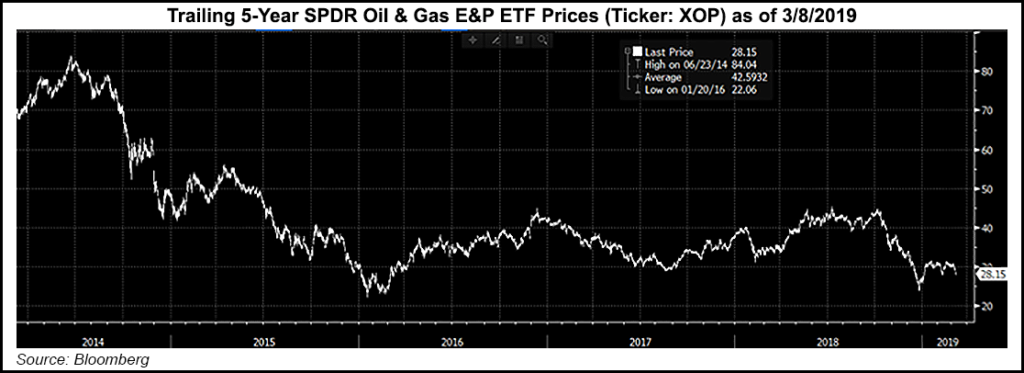E&P | Markets | NGI All News Access | Regulatory
Norway’s $1T Sovereign Fund to Dump E&P Stocks
The government of Norway on Friday proposed dropping a who’s who of U.S. independents from its estimated $1 trillion pension fund to reduce the “aggregate oil price risk” to the economy. Integrated producers, many with substantial renewables businesses, would not be impacted.

“The objective is to reduce the vulnerability of our commonwealth to a permanent oil price decline,” said Minister of Finance Siv Jensen. “Hence, it is more accurate to sell companies which explore and produce oil and gas, rather than selling a broadly diversified energy sector.”
Companies classified as exploration and production (E&P) companies by the index provider FTSE Russell would be excluded from the Government Pension Fund Global (GPFG) benchmark index and investment universe. The proposal would serve to “reduce the aggregate concentration risk associated with this type of activities in the Norwegian economy.”
The assessment “does not reflect any specific view on the oil price, future profitability or sustainability of the petroleum sector, and it is independent of the government’s current petroleum policy, which remains unchanged.”
The proposal next will be put to a parliamentary vote, but there was no timeline for action stated.
The move follows that by the country’s supermajor Equinor ASA, 67% owned by the government, which last year changed its name from Statoil to kick “oil” from its brand to reflect a broader portfolio that includes oil, natural gas and renewables.
“The oil industry will be an important and major industry in Norway for many years to come,” Jensen said. “The state’s revenues from the Continental Shelf are, as a general rule, a consequence of the profitability of exploration and production activities. Therefore, this measure is about diversification.”
E&Ps would be phased out of the fund gradually, with plans prepared in consultation with Norges Bank. The recommendations are outlined in a white paper also published on Friday.
“A permanent reduction in the oil price will have long-term implications for public finances,” the finance ministry acknowledged. “An exclusion of energy stocks in the GPFG will serve to further reduce the oil price risk, but the effect appears to be limited. We have high capacity to take on such risk, and the oil price risk has been significantly reduced over time, because a large portion of the oil and gas resources has been extracted from the Norwegian Continental Shelf and converted into a broadly diversified financial wealth abroad.”
The energy sector is a broad sector, it noted, comprising integrated companies (including ExxonMobil Corp., Royal Dutch Shell plc and BP plc), that have businesses throughout the value chain, as well as pure-play renewable energy units.
“It is anticipated that almost all of the growth in listed renewable energy over the next decade will be driven by companies that do not have renewable energy as their main business,” Jensen said. “The fund should be able to participate in this growth.”
As such, the fund will not exclude the integrateds, only those E&Ps whose primary business is in oil and gas development. The stake in Equinor, therefore, would not be sold.
A lengthy list of U.S.-based E&Ps now in the fund that could be divested include Anadarko Petroleum Corp., Apache Corp., Cabot Oil & Gas Corp., Carrizo Oil & Gas Inc., Chesapeake Energy Inc., Continental Resources Inc., Devon Energy Corp., Encana Corp., EOG Resources Inc., Laredo Petroleum Inc., Marathon Oil Corp., Newfield Exploration Co., Noble Energy Inc., Occidental Petroleum Inc., Pioneer Natural Resources Co., Range Resources Corp. and Targa Resources Corp. The fund invests in a myriad of international E&Ps, as well as in Houston-based Cheniere Energy Inc., primarily a liquefied natural gas operator.
“Climate risk is an important financial risk factor for the GPFG, and will over time have an impact on several of the companies in which the GPFG is invested,” Jensen said. The ministry plans to work with Norges Bank to review its efforts “relating to climate risk in the GPFG, with a view of strengthening efforts in relation to those individual companies accounting for the largest contributions to the climate risk associated with the fund.”
In November 2017, Norges Bank advised the finance ministry to exclude the oil and gas sector from the benchmark index for the GPFG to reduce the oil price risk associated with the state’s wealth. The issue has been circulated for public consultation, and the ministry said many of the groups invited to submit consultative comments “appear to agree with the assessment of the expert group that the economic impact of Norges Bank’s proposal on oil price risk in the Norwegian economy would be limited.”
However, “there are nonetheless diverging opinions as to whether the energy sector should be excluded from the GPFG. Whilst a number of the consultative comments emphasize that it would be a step in the right direction, others note that it may undermine the financial objective of the fund and encompass companies with major and expanding renewable energy operations.”
If the divestment proposal is enacted by the Norwegian parliament, it would “deal a large blow to the illusion that the fossil fuel industry still has decades of business as usual ahead of it,” said 350.org’s Yossi Cadan, senior divestment campaigner. “This divestment proposal is a big step in the right direction, but it doesn’t go far enough to help avoid climate chaos.”
© 2024 Natural Gas Intelligence. All rights reserved.
ISSN © 1532-1231 | ISSN © 2577-9877 |
